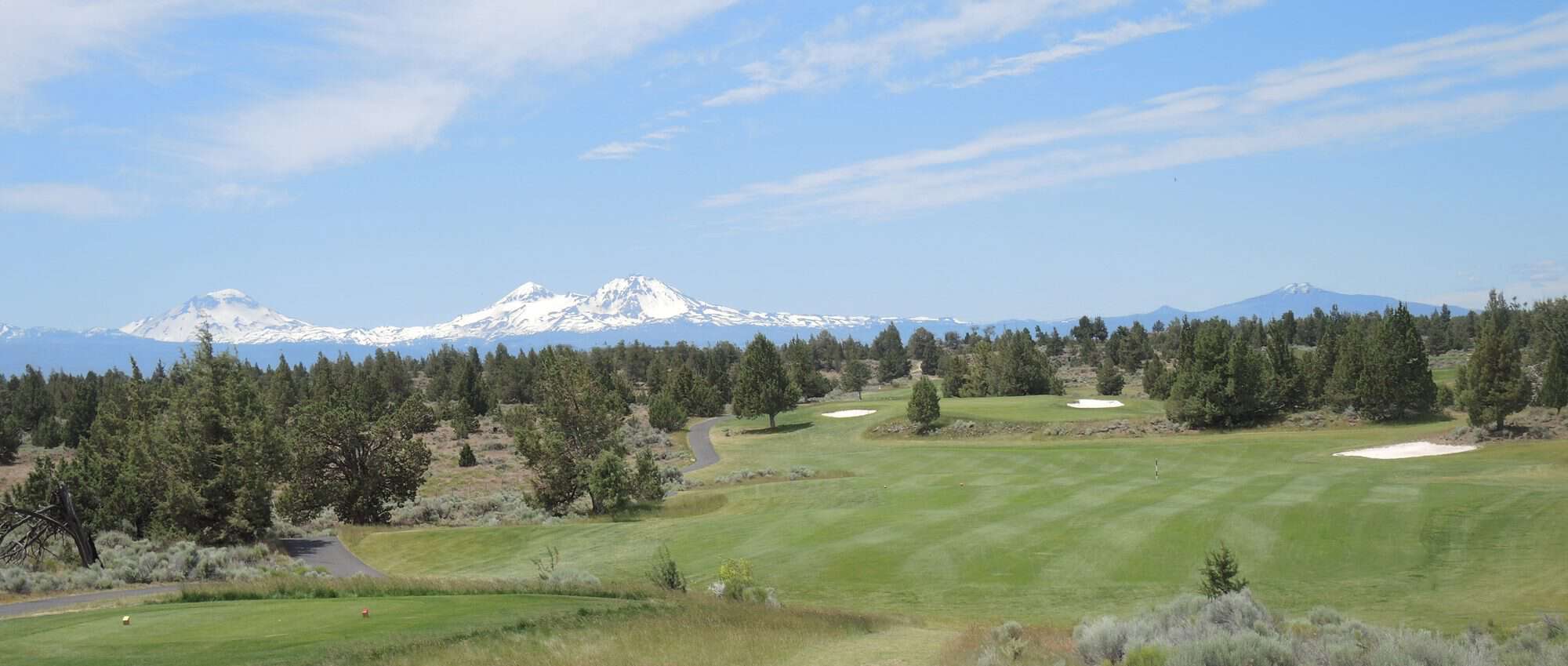Oregon is blessed with a great diversity of courses: world class public courses, exquisite private courses, and great neighborhood courses in every corner of the state. Ownership of these courses is also very diverse: well-to-do individuals, multi-national corporations, municipalities, local partnerships, neighborhoods, clubs, and families.
Some of the best times I have had playing golf in Oregon have been on family or individually owned and operated courses that dot the state. You can tell by playing the course and talking with the owners that operating a family or individually owned golf course is a labor (long hours every day) of love. I wanted to get a better understanding about how one or two people could possibly operate a golf course and why they do it.
I was fortunate enough to have the opportunity to talk with three such owners. Their backgrounds and interest in running a golf course is as diverse as the golf courses they operate.

Eric Wayne Anderson is the owner and operator of Olalla Valley Golf Club, a nine-hole, par 37 course outside of the Newport/Toledo area on the Oregon Coast. Born in Portland, Oregon, Eric worked in Bend for a map and blue print store when he was introduced to golf when doing aerial photography at Crosswater. He then got hired at Crosswater in 1998 where he worked on the greenkeeping crew for four years. He then helped to build the Nicklaus Course at Pronghorn and obtained his horticultural degree at Oregon State University. Eric then interned at St Andrews (yes, that St Andrews), and returned to be the director of facilities (including the golf course) at Skamaina Lodge in Washington. He was looking for a change and wanted to be on the coast when the job of managing Olalla opened in 2015. He then bought the course in 2018 (the property is leased from a third party).
Chris Gesik is the owner and operator of Frontier Golf Club, a nine-hole, three-par course south of Portland. Born and raised in Oregon, Chris spent most of his life working in the car business. He played golf since he was 8, and was a member of nearby Willamette Country Club for over 20 years. Before buying Frontier in 2018, Chris had no experience in managing or operating a golf course.
Scott McKinney is the owner and operator of Country View Golf Course, a nine-hole, par 36 course between Ontario and Nyssa near the eastern border of the state. Scott was born and raised on a family farm in Idaho and went to college at Treasure Valley Community College. He worked in a variety of jobs, including timber, public works, and State Parks. He had only played a few rounds of golf before deciding to design and build Country View. The course was built in 1998 and opened in 1999.

Why did you buy a golf course?
Eric: Ego. I always thought I could do it better and cheaper, but found out that it takes so much more to operate a course, especially when you include clubhouse operations.
Chris: I lived close by and was familiar with the property when it came up for sale. I thought it was a reasonable price for just the property and the house. The course was in really bad shape, and I knew, even with zero experience, I could do better.
Scott: My parents bought the property as a farm. I then convinced them to convert the farm to a golf course. Neither had played golf before [Scott’s father has passed, but his mother took up the game and still plays at 80]. I was convinced so I convinced them that operating a course might be a better than having to keep changing the hand lines on a farm every day.
Describe your course.
Eric: A beautiful but challenging course. Great place to chase a ball around and have a great time.
Chris: Beautiful, fun, and challenging 9-hole, par-3 course. Great for beginners and still a lot of fun for the lower handicap player.
Scott: Family owned and family friendly 9-hole course with canyons, ups, downs, and all-arounds. A place where you can improve your game, or can learn if you are just starting.
What are your duties in operating the course?
Eric: Everything. In the summer I work 3am to 7pm most days. I get up and water and set the course. Then I work in the clubhouse. The afternoons I do what needs to be done on the course, in the clubhouse, or doing the books. Outside of summer, most days are from 6am to 6pm.
Chris: Until recently, I did everything, on the course and inside the clubhouse. Hours are pretty much 6:30 in the morning to 7 at night, 7 days a week. In the winter, I am able to shorten that a few hours each day.
Scott: Everything. Clubhouse, mowing, mechanic, accounting. I take out the garbage and clean the bathrooms. Hours on the course run sunrise to sunset, and then I do books and repair work at night. Seven days a week.

Do you get any help?
Eric: Only in the summer time, when my stepson and his girlfriend help. He helps with mowing, and she works in the clubhouse.
Chris: I do for plugging and sanding the greens, equipment repair and maintenance, and tree removal. I do all the day to day “crew” work. My wife, as of recently, helps in the clubhouse.
Scott: My wife and mother help in the clubhouse. My kids helped until they got old enough to know better. My brothers help with the big projects. But there are also a lot of volunteers and members of the men’s club who help on the range, mowing, trimming, and fixing up things. The course would not survive if it wasn’t for the volunteers and members.
What has been the biggest positive surprise for you in operating the course?
Eric: I get to run with my vision of the greens. I have been able to install bent grass and have kept the poa annua away.
Chris: Support from the community. Hardly a day goes by when someone doesn’t stop and thank me for getting the course back in shape.
Scott: Meeting all the people and being able to give to the community. And having a place where the family could be and work together.
What has been the biggest negative surprise for you in operating the course?
Eric: Taxes. Not just taxes but the many types of taxes. I am not against paying taxes, I just didn’t know there would be so many types.
Chris: The hours. It’s a lot of work!
Scott: The long hours, especially the number of hours required in the clubhouse.

Did you have an ideal of what operating a course could be like before you bought one?
Eric: Yes, because of managing the course before. But I did not maintain the books for the full operations until after I became owner, and that was a whole different thing.
Chris: I really wanted to build something that the community could be proud of again. In its heyday, Frontier was a real hidden gem. I wanted it to be the same, just not quite so hidden.
Scott: I was thinking that it would be steady work and that in a few years I could build another nine holes.
How close to that ideal did you get?
Eric: Pretty close, except the long hours and the financial squeeze that prevents me from obtaining the help I need to operate the course like I want to.
Chris: I am getting pretty close. Each year the course gets better and better.
Scott: We never got sustained traction. Golf went way down in 2011 and 2018 and we suffered a lot of damage from the snow in 2017. Every time it started to look like things would be better, something would happen to make it slip back. From a financial perspective, it’s more like operating a family farm: you have good years and you have bad years.
What is your greatest expense?
Eric: Labor and electricity.
Chris: Equipment. The only thing here that was functional when I bought the property was an old John Deere walk-behind mower. I still use it today. Month to month its fuel, electricity, and fertilizer.
Scott: Power, fuel, and equipment repair and lease costs.

What is your target audience?
Eric: From the Willamette Valley and up and down the coast. We get regular players from Corvallis as well as Toledo, Newport, Lincoln City, and Waldport.
Chris: Families. I really like the mom, dad, and two kid foursomes. Those kids are my future business!
Scott: When we opened, it was mostly retirees from the area. But we are seeing a lot more women and juniors and we are trying to accommodate them with events and fee breaks. We regularly get players from as far away as Boise and Burns.
How are you trying to reach more possible players?
Eric: Facebook and targeted TV ads, especially in Corvallis.
Chris: Just word of mouth.
Scott: I have a tight advertising budget. I have tried TV, radio, and newspaper ads, but they didn’t seem to work. Now it is mostly word of mouth, that includes people’s Facebook pages about the course.
What is your favorite thing about owning and operating a golf course?
Eric: It’s really an honor to serve the local golfers, and I am thankful to operate the course. It is also great to have the final say in what is done on the course.
Chris: Most of the time, I enjoy the work and being outside. When I had a desk job for all those years, it was something I wish I could do.
Scott: Being on the course in the morning and watching the sun rise. Seeing the dew on the grass and the view across the valley from Nyssa to Ontario. Being the only thing out there except the deer and the turkeys. It is really peaceful.

What is your least favorite thing about owning and operating a golf course?
Eric: Lack of sleep. Not having the collaborative experience where I can talk with others to bounce ideas off of.
Chris: The number of hours. The place would not work financially if I had to hire people to help. And I was operating at a loss for two to three years before turning it around.
Scott: The long hours that you put in seven days a week. You can get burned out.
What is your advice to anyone considering buying a golf course?
Eric: You need thick skin. Everyday someone complains. But you do get to look at the course and say “I did that.”
Chris: Need to keep costs under control and plan for the worst. If you get lucky, and things turn out well, that’s great. But know your limits and be prepared to step away. For the first six weeks after we bought the course, all I did was pick up sticks and pinecones that were embedded in the ground. It’s 45 degrees and raining sideways and I am thinking “What did I do?”
Scott: The irrigation system is the life blood of the course. The pumps are the heart and the lines are the veins. If you do not have a good, reliable irrigation system, you can be in big trouble. And know how big the local golfing public is and what they are like.
Now that you know more about these courses, I would encourage you to go play them (and have fun)!

Submit your review | |


